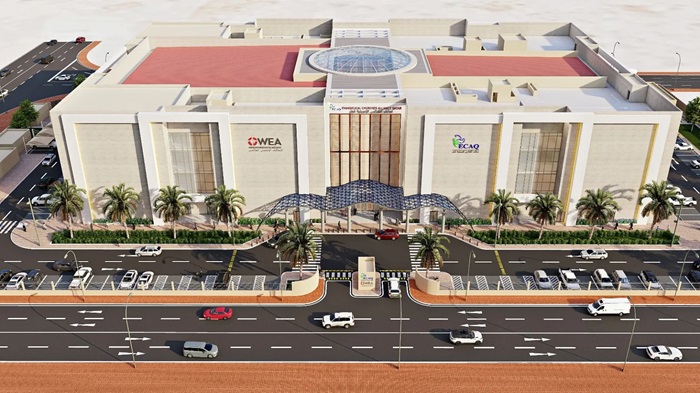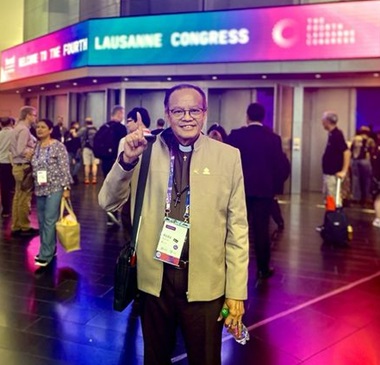
Bishop Beda Robles believes the church in Qatar is “the voice of Isa to the Muslim world.”
Qatar is not noted as a centre of Christian activity. But the Bishop of the Evangelical Churches Alliance Qatar (ECAQ) says God is very much at work there.
When I met him in the halls of the Fourth Lausanne Congress in Incheon, Korea in late September (among the 5,400 participants from 200 nations milling about us), he was enthusiastic about the prospects for the church in that small, wealthy nation on the east coast of the Arabian Peninsula.
“Truly, Qatar has been blessed by the Lord,” he told me during our 20-minute chat between sessions.
Bishop Beda Robles, originally from the Philippines, has been “serving the Lord in Qatar for the past 38 years.” He now chairs ECAQ, which in less than two decades has grown from a small network of Filipino churches into a body of 129 Evangelical and Pentecostal churches with more than 17,000 members.
The congregations represent a wide range of other backgrounds as well – Africans, Indians, South Africans, Arabic Christians, Sri Lankans, Nepalese, Indonesians and Korean – with names such as Assembly of the Lord Christian Church Qatar, Doha Arabic Evangelical Church, Jesus Christ the Deliverer Qatar and Qatar Nepalese Christian Ministries. (Doha is the capital of Qatar.)
Religious Complex set aside
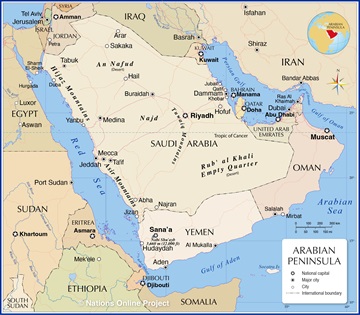
Qatar is a small nation on the east coast of the Arabian Peninsula. Map from Nations Online Project.
The desire from the beginning was that there would be “a permanent worship building for all the believers in Qatar to practice their faith and worship God freely.”
The EQAC site says God has answered their prayer:
Bishop Robles said that eight Christian groups have been allotted space in the Mesaimeer Religious Complex. He meets monthly with leaders of the other religious groups – Roman Catholic Church, Anglican Church, Inter-Denominational (Indian) Christian Church, Maronite Church, Jacobite Syrian Orthodox Church, Greek Orthodox Church and Coptic Church.
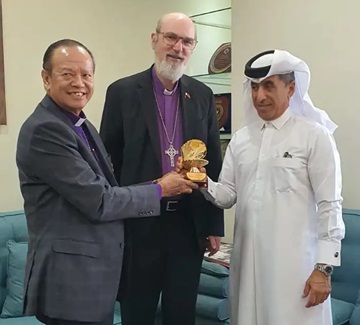
Bishop Beda Robles (left) with Thomas Schirrmacher, Secretary General of World Evangelical Alliance (recently retired) and Dr. Ibrahim Al Nuaimi, Chair of Doha International Center for Interfaith Dialogue. Image from ECAQ site.
Six of the groups already have buildings, the first of which was built in 2008, but the Maronites and the Evangelicals do not yet.
However, he said, “The Emir has been so good to the Christians.” He said the land was given to the Evangelicals in 2015, but has been held up because the government has considered using it for other purposes.
Confirmation took place last year, aided by the intervention of World Evangelical Alliance (WEA) leader Thomas Schirrmacher, who visited Qatar and spoke directly with the Emir.
Bishop Robles said the building will also be home to the WEA’s third headquarters – “the first in a Muslim nation.” (The other two are in New York and Geneva.) He said they have two or three years to raise the money for the building; the project is expected to begin early next year and be completed by 2027.
The World Evangelical Alliance (WEA), in describing its 2023 highlights, said ‘Strategic Priority #1’ was strengthening national alliances. Its first example involved Qatar: “One highlight was the gift of a piece of land for Evangelical Churches Alliance Qatar [ECAQ] the ‘House of the Lord.’”
Prosperity of the City
The ECAQ website states:
ECAQ’s presence in Qatar not only offers religious services but also extends support and assistance to its members in times of need. The alliance serves as a beacon of hope and comfort for individuals facing challenges or seeking guidance in their faith journey. Additionally, ECAQ actively engages in outreach programs and charitable initiatives embodying the values of compassion and service to the community.
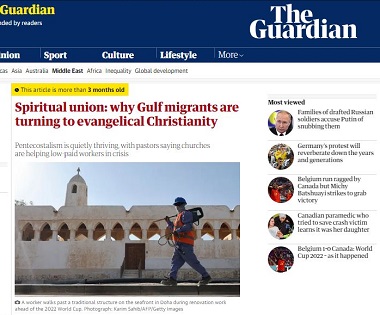 The phenomenon of church growth, and service, was particularly noted during the lead-up to the FIFA World Cup in Qatar in 2022. Bishop Robles told me that evangelicals have in particular been very involved as volunteers in sporting events.
The phenomenon of church growth, and service, was particularly noted during the lead-up to the FIFA World Cup in Qatar in 2022. Bishop Robles told me that evangelicals have in particular been very involved as volunteers in sporting events.
A July 31, 2022 article in the Guardian (‘Spiritual union: why Gulf migrants are turning to evangelical Christianity’) began:
Evangelical Christianity is quietly flourishing among migrant groups in the Gulf as churches provide low-paid workers facing horrific abuse with aid in times of crisis, according to pastors and parishioners across the region.
About 30 million migrant workers live in the Gulf Cooperation Council (GCC) states – Bahrain, Kuwait, Oman, Qatar, Saudi Arabia and the United Arab Emirates – the muscle transforming oil-based economies into glittering 21st century metropolises.
In some Gulf states, migrants make up most of the population, and about 80% are employed in construction, hospitality and domestic jobs.
The Guardian has interviewed pastors and parishioners of churches in all six Gulf countries and found that migrants, including those from Hindu and Catholic communities, are converting to Pentecostalism, one of the fastest-growing religions on Earth with more than 600 million followers.
To cope materially and spiritually, many attend Pentecostal churches because they focus on people’s needs in the here and now – namely health and wealth – as well as the ever after.
Go here for the full article, and here for my write-up at the time.
‘Voice of Isa’
Bishop Robles clearly loves Qatar, and admires much about it. He appreciates the way in which Qatar is looked to as a negotiator when there are problems in the area, and beyond. He pointed to the Doha Conference on Interfaith Dialogue which took place earlier this year; the opening session included a presentation by Archbishop Makarios Mavrogiannakis – Archbishop of the Greek Orthodox Christian Churches Steering Committee in Qatar.
On a personal level, he has been invited to the Emir’s palace for the Eid holiday.
He told me he is “amazed at what the Lord is doing with Doha, Qatar,” adding that “Qatar is giving us our freedom to express our faith.” He also noted the reality that local Qataris are fewer in number than expatriates.
He is clear that their freedom to reach out does not apply to proselytizing to Muslims, but says, “We believe we’re the ones who will reach our brother Muslims with the love of Jesus – we are the voice of Isa [Jesus] to the Muslim world.”
And he is very happy to see evangelical churches around the world supporting them.
I have posted several articles about Lausanne 4.

